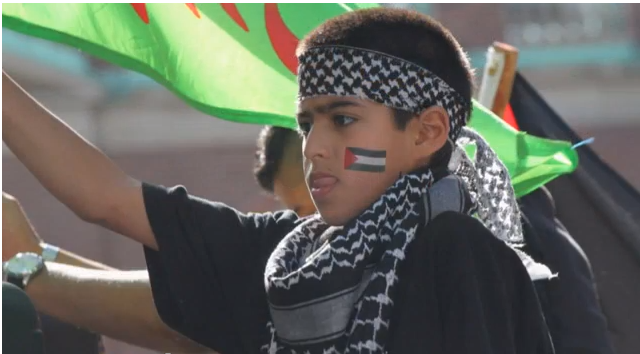 |
| An Israeli girl (left) smiles at a Syrian girl who suffered severe injuries when a shell exploded in her village. |
“.מי שהציל נפש אחת -
כאילו הציל עולם ומלואו”
“Whoever saves a life,
it is as if he saved the entire world.”
(Associated Press) NAHARIYA, Israel — It looks like a standard scene in the corner
of the children's intensive care unit at a hospital in this northern Israeli
town. The counter is jammed with stuffed animals, and balloons shaped like
princesses float against the ceiling. A nervous, silent father hovers over his
injured daughter.
But he and the girl are Syrians, spirited
across the border by the Israeli military for medical treatment unavailable
amid the civil war at home. He is silent because he cannot speak Hebrew,
nervous because his presence in Israel, Syria's long-time enemy, could place
his family in danger if his trip is discovered.
He came to the hospital six days ago, following after his daughter. He refuses
to say how he arrived, and hospital staff step in quickly to deflect questions
about the journey. He has no contact with his family at home. All of this, he
says, is worth it.
“For my daughter, I'm willing to do anything,”
said the father, who, like his 12-year-old daughter, could not be named because
he fears repercussions in Syria.
While he was grateful for high-quality medical
care, he was visibly afraid of the potential consequences of his trip, speaking
in one-word answers and keeping his eyes lowered. He checked footage filmed by
an AP Television News crew to make sure his daughter's face was obscured.
On both sides of the Syrian civil war,
militant groups like Hezbollah and fighters linked to al-Qaida are virulently
opposed to Israel's existence.
The Syrian regime itself is a longtime Israeli
enemy, and its citizens are banned from travel there, facing possible jail time
if they are discovered.
The two countries have fought two wars, and
Israel has annexed the Golan Heights, a plateau it captured when Syria attacked
Israel in 1967.
President Bashar Assad and his late father
Hafez, the former Syrian ruler, have used their anti-Israeli stance as a source
of legitimacy and have hosted and funded anti-Israeli militants.
 |
| A young Syrian girl in Israeli hospital |
Generations of Syrians have grown up under
propaganda vilifying the Jewish state.
All of this means that the father's presence
in Israel could mean trouble for his family back home from any number of
groups.
Those fears, said Dr. Zonis Zeev, the head of the children's ICU
at Western Galilee Medical Center in the city of Nahiriya, are often the
hardest for the patients to overcome.
"Probably at
some time they were told about the 'animals' on the other side of the border,
us, like the Zionists or the Jews," he said. "So they are terrified,
and we have to treat the anxiety not less than treating the physical part.
Sometimes it is much harder."
The hospital has treated 44 Syrian patients since March 27, four
of them children as young as 3 years old. The 12-year-old daughter is one of
seven Syrians currently scattered throughout different wards of the hospital,
most guarded by Israeli soldiers stationed outside their rooms.
The Ziv Medical Center in the city of Safed,
along with Army field hospitals, have also taken in Syrian patients.
Dr. Masad Barhoum, director-general of the
hospital, said those numbers were a “drop in the ocean” given the scale of
violence in Syria. The United Nations announced last month that their estimated
death toll in the Syrian civil war had topped 100,000 people. Still, he said,
his doctors are proud to offer whatever help they can.
In the case of the 12-year-old girl, her
father had taken her to an aunt's house, thinking she would be safer there than
at home. Instead, standing in the doorway of the sitting room 16 days ago, the
girl was struck by flying shrapnel. The metal damaged her kidneys and spleen
and wounded her back, said Zeev, the ICU chief.
The daughter underwent surgery in a hospital
in Syria. It was there, the father said, that he heard secondhand whispers that
treatment was available in Israel. “I heard from people that they treat people
well here,” he said.
After five days in the Syrian hospital, the
girl said, a relative of her aunt took her to the border.
The hospital used Arabic-speaking teachers and
social workers to talk to the girl, and the aunt of another patient became like
a surrogate mother to the rest of the ward. The staff provided comforts like a
red stuffed elephant and portable DVD player. Her spirits were lifted five days
later when her father showed up.






